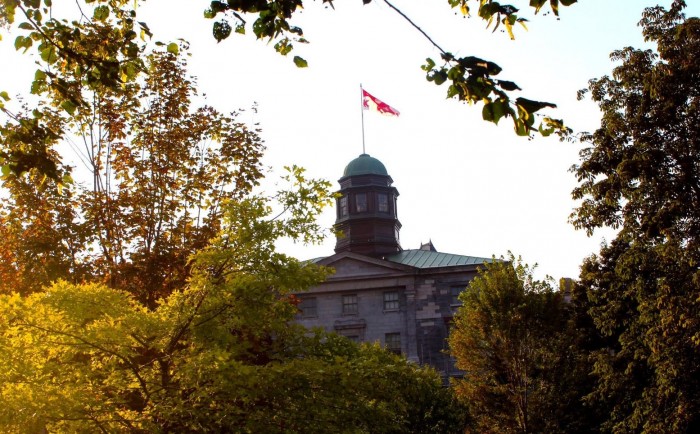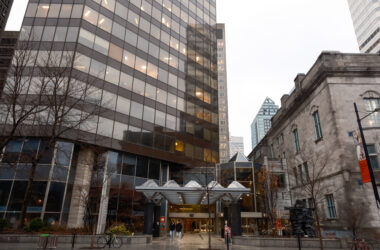McGill University has an extensive system of governance bodies that manage its affairs from the undergraduate level up to administration. Making sense of this immensely complicated system is challenging to the untrained student, so we’re here to help you understand the who’s and what’s of this year’s campus politics.
SSMU
Who they are and what they do
The Students’ Society of McGill University (SSMU) represents all undergraduate students at McGill, as well as students in professional degree programs, including law, dentistry, and medicine. SSMU advocates on behalf of students to the administration, and to provincial and federal governments, manages services such as student groups and minicourses, and operates businesses such as Gert’s and the Student-Run Cafeteria (SRC).
SSMU is led by seven executives who are elected annually during the Winter semester. The Legislative Council is the legislative body of SSMU, and consists of the executives and 30 councillors elected from faculty associations and certain student demographic groups, such as First Year Council. The Legislative Council is responsible for large-scale policy and decisions pertaining to the society’s finances. At least once a semester, members of the society have the opportunity to vote in referenda and participate in General Assemblies, with the resulting policies decided through these platforms becoming SSMU regulations.
The SSMU Judicial Board (J-Board) consists of seven students, most of whom are from the Faculty of Law. They make rulings on cases in which any individual, organization, or referendum associated with the society is alleged to have violated the SSMU Constitution or Bylaws. Decisions of the J-Board can only be overturned by a four-fifths majority vote by SSMU’s Board of Directors.
Recent actions
Last year, SSMU Council passed a Policy on Indigenous Solidarity that laid out ways in which the society can pursue its social justice goals for indigenous students. Council also passed a new climate change policy. In the Winter 2017 referendum, students voted to add a seventh executive portfolio and to redistribute responsibilities among the executives. A motion to increase the society’s budget failed leading to a round of budget cuts.
On the agenda this year
This is the first year that SSMU has a Vice President (VP) Operations, and a VP Student Life. The roles of most of the executives have been adjusted as well, so it will be a year of precedent-setting for these student leaders. Furthermore, the executives are faced with the added challenge of operating the SSMU on a smaller budget. The SSMU Sexual Assault Policy Working Group’s policy was recently rejected by the administration, ensuring this year will see extensive discussions on the creation of a new policy proposal. Furthermore, the J-Board recently ruled against divisive motions, such as last year’s motion in support of Boycott, Divestment and Sanctions (BDS) against Israel, a decision that is sure to be the subject of discussion in coming months.
PGSS
Who they are and what they do
The Postgraduate Students’ Society (PGSS) represents all graduate students and postdoctoral students. It is comprised of six executives, four commissioners, and eight staff members, who advocate for postgraduates at the university, provincial, and federal levels. The PGSS is housed in Thompson House, and is a source of social activities and support for its members. PGSS Council is the governing body of the society and meets monthly to vote on policies pertaining to the long-term vision of the society. Councillors are elected from various postgraduate faculties and student groups.
Recent actions
Last year, PGSS Council unanimously passed a motion calling on McGill to divest from oil and gas industries. Additionally a traditional territory acknowledgement that will be displayed predominantly on the PGSS website and be read before each Council meeting was approved. PGSS has just completed its second graduate student orientation, which featured expanded programming.
On the agenda this year
This year, PGSS executives have promised to focus on the political role of the society, increasing their representation in activism on issues approved by their constituency. This includes increased emphasis on environmental sustainability initiatives. Expanding programming for graduate student orientation will likely be a focus as the new program continues to find success.
McGill Senate
Who they are and what they do
The McGill Senate is an administrative body with jurisdiction over the academic policy of the university. It serves as a platform for representation at the administrative level. There are 107 voting members, including professors, support staff, students, SSMU executives, and representatives from McGill’s senior administration. Thirteen student senators are elected annually to represent each academic faculty. The Senate has multiple committees on specialized issue areas that advise on policy such as honorary degree recipients, enrollment, and student affairs.
Recent actions
Last year, the Senate passed a motion to establish a statement on academic freedom intended to reaffirm McGill’s commitment to research. They also extensively discussed tuition deregulation and a new commitment to increasing funding for refugee students.
On the agenda this year
Last year, the Senate deferred $1.3 billion of maintenance upgrades to campus buildings, renovations that will most likely be a topic of discussion again this year. The Senate will make further revisions to the Student Assessment Policy.
McGill Board of Governors
Who they are and what they do
The McGill Board of Governors (BoG) has final authority over all university affairs. It is comprised of 25 voting members, including one representative each from PGSS and SSMU, and members of senior administration, as well as two non-voting student observers. The Board manages all university property, appointments of personnel, management of investments and finances, ethics and human resources. Usually, the board meets six times per year.
Recent actions
Last year, the BoG voted not to divest university investments from fossil fuel companies, a decision that was met by student and alumni backlash. They also launched a study into the acquisition of the Royal Victoria Hospital (RVH) and how it can be turned into classroom space.
On the agenda this year
The acquisition of the RVH site, as well as divestment from fossil fuel companies and ethical investment, are sure to be continued subjects of conversation for the BoG this year. Given the provincial government’s continuing austerity programs, limitations of the university budget will likely be debated.









